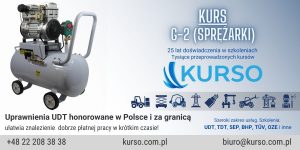Course in compressor operation and maintenance
Our KURSO centre provides training for authorisations to operate and maintain industrial compressors, among others. Many years of experience in the training industry have enabled us to develop effective and professional programmes on the basis of which we conduct our classes. In addition to the content knowledge, we focus primarily on ensuring that our trainees improve their practical skills, showing them how to safely operate the equipment discussed during the course.
How do you get certified on compressors?

In order to gain your air compressor licence, you need to prepare properly for the state qualifying exam. Our KURSO centre provides training for industrial compressor operators and maintainers, which comprehensively prepares trainees to pass the skills test. The compressor course ends with an examination before a commission appointed by the ERO. By passing the exam, the participant acquires a licence which is valid for 5 years.
Scope of training
Topics covered in the training primarily include:
- automatic pressure control equipment;
- health, safety and hygiene regulations;
- legislation on rules for the operation of equipment;
- classification of compressors - compressors, with regard to their construction and principle of operation (rotary, reciprocating, flow);
- the characteristic sizes of compressors, suctions and blowers;
- pressure vessel requirements;
- compressor capacity control methods;
- steps in starting and stopping compressors depending on their design.
Purpose of the course
The premise of our training is:
- preparing participants for the state examination and obtaining the relevant qualification certificates;
- to acquire the necessary skills and knowledge for the maintenance and operation of compressors.
What can you learn during the course?
Participating students learn about legal acts relating to the operation and maintenance of compressed air equipment and systems, as well as health and safety regulations. In addition, trainees acquire knowledge of automatic air control equipment. They also learn about the most important parameters of compressors, blowers and suction nozzles. Participants also learn how to properly start and stop various types of compressors.

Requirements for the candidate
To join the course you must:
- be at least 18 years old;
- have a minimum of primary education;
- provide a medical certificate of good health and ability to work as an industrial compressor operator or maintainer.
Air compressors - what are they and what are they used for?
There will undoubtedly be a group of people who have encountered a lack of air in the wheels of their car or bicycle. We are probably familiar with these situations. Nowadays, we have the comfort of being able to get to vulcanisation shops where the staff can deal with the problem, but has anyone ever wondered how the machine that inflates the wheels works?
Air compressors are electric machines designed to achieve high pressure of technical gas and to force its flow. These machines are ideal for use in both domestic and industrial settings or in bulk transport. They are an essential component for the proper functioning of many devices, tools or installations. In industry, they are used when painting or pumping car tyres, for example. In addition, they are used in the pumping of natural gas and the charging of internal combustion engines.
Breakdown of compressors
By type of construction we distinguish:
- Reciprocating compressor - This is otherwise known as a positive displacement compressor. The operation of this compressor is very simple, as the machine takes in air which, by means of a piston, reduces its volume and increases its pressure.
- Rotary screw compressor - is a positive displacement machine whose compression is achieved by two rotors rotating in opposite directions. Compressed air can be contaminated by oil or moisture in the air, so air treatment, i.e. purification of toxins and excess water, is often required.
- Centrifugal compressor - It is otherwise known as a dynamic compressor because it raises the air pressure. This machine is oil-free and its circulation and lubricants are separate, so it does not require frequent servicing. It works best in situations where we have perfectly clean air.
If you have any questions, please feel free to contact our training centre.


